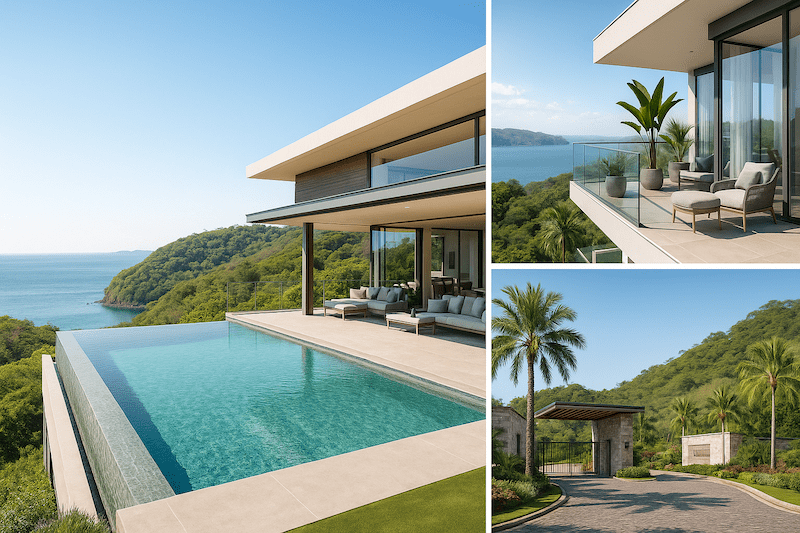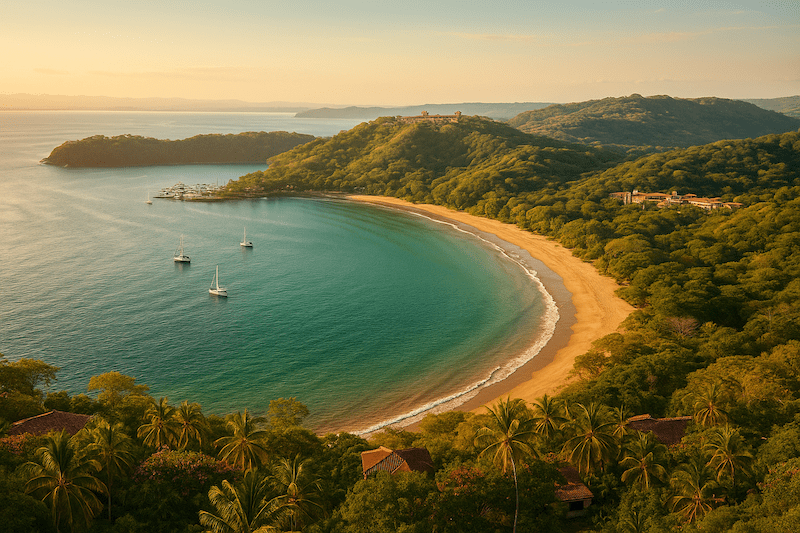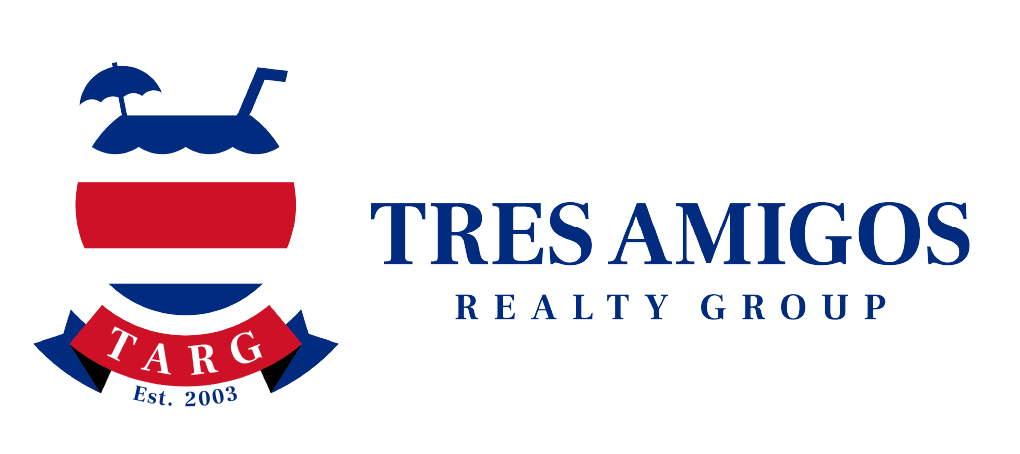1. General Questions About Buying in Costa Rica

Can foreigners own property in Costa Rica?
Yes, foreigners have the same ownership rights as locals. Title can be held in your personal name or through a corporation, and ownership is protected under Costa Rican law. The only restriction is for concession land within 200 meters of the shoreline, which has special rules.
Do I need residency to buy property?
No, you don’t need residency to purchase real estate in Costa Rica. Many people buy first and then apply for residency later if they decide to stay longer term or qualify through an investment visa.
Is financing available for foreigners?
Traditional bank financing is limited and often requires residency plus significant documentation. However, private lenders and owner financing are sometimes available, especially in resort areas like Papagayo, though terms and interest rates vary.
Can I own the property in my own name?
Yes. Many buyers take title personally, while others—especially if they won’t live in Costa Rica full-time—prefer a Costa Rican corporation (e.g., S.R.L. or S.A.) for convenience, liability separation, or estate planning. Your attorney can advise and handle the setup if you choose a corporate structure.
2. Understanding the Papagayo Region

Where is the Papagayo region located?
The Papagayo region is in northern Guanacaste, just 20–30 minutes from Liberia International Airport. It includes such places as Playas del Coco, Playa Hermosa, Playa Panama, and Playa Ocotal, each offering its own unique feel and community atmosphere.
Why is Papagayo considered one of the best places to buy property?
Papagayo offers world-class beaches, a state-of-the-art marina, and luxury resorts like the Four Seasons, Andaz, and the new St. Regis Residences. At the same time, it has local charm and easy access to schools, supermarkets, and medical care.
What types of properties are available in Papagayo?
You’ll find ocean-view condos, gated community homes, luxury hillside villas, residential building lots, development land, farms (aka fincas) and commercial properties and businesses. Many communities offer resort-style amenities such as pools, gyms, security, and direct beach access. There are also many commercial and development opportunities available. Some of these are listed on our websites but we also have deep contacts in the area if you are looking for specific investment opportunities.
3. Legal and Due Diligence
Do I need a lawyer to buy property in Costa Rica?
Yes, it is strongly recommended. Your attorney ensures clear title, proper registration in the National Registry, and that all taxes are current before closing. They also handle escrow and protect your funds during the process.
What is a Plano Catastro?
This is the official registered survey of the property. It includes details like size, boundaries, and location, and your lawyer will confirm that it matches the title and that there are no overlaps or disputes.
How are closing costs handled?
Most closings are conducted in escrow with funds held securely until the title transfer is complete. Escrow accounts are administered by SUGEF-registered trust/escrow companies to meet Costa Rican banking and compliance standards. Closing is typically managed by a notary public (who is also a lawyer in Costa Rica) once all due diligence checks are cleared. Here is our complete guide to closing costs in Costa Rica.
Is there licensing for Costa Rica real estate agents?
Yes and no. There is licensing in Costa Rica for real estate agents and recognized professional associations, but participation isn’t required by law. This has resulted in some real estate agents not being licensed. Reputable agents typically maintain credentials and join associations such as CRGAR/CCCBR, complete coursework similar in spirit to NAR-style standards, and adhere to codes of ethics and ongoing education. All agents at Tres Amigos Realty Group are licensed and required to follow a strict code of ethics.
Is Title Insurance available?
Title insurance is not commonly used today in Costa Rica. Because all properties are recorded in the National Registry, a competent attorney can trace the chain of title and uncover liens or encumbrances during due diligence—providing the protection buyers expect without the extra policy cost.
Can I own beachfront property?
Beachfront in the maritime zone (the first 200 meters from the mean high-tide line) is known as "concession" land administered by the local municipality. Concessions (rights to use the land) are typically granted for set terms (often 20 years) and renewed if requirements are met; citizens and certain qualifying residents can be concession holders. Some projects near the beach use corporate/share structures so buyers own their unit via shares. We can explain the specifics for any property you are considering, or your attorney will fill you in on the options available to you.
4. Costs and Taxes
How much are closing costs in Costa Rica?
Closing costs are typically 3–4% of the purchase price, covering notary fees, registration, and transfer taxes. The buyer usually pays these costs, though sometimes they are negotiated between buyer and seller.
What are property taxes in Costa Rica?
Property tax is just 0.25% of the declared value annually, making it very affordable compared to most countries. Homes over a certain value threshold may also be subject to a “luxury tax,” which is recalculated every three years.
Are there HOA fees?
In certain cases yes there are. If you purchase in a gated community or condo project, you can expect to pay a monthly fee that covers things such as 24/7 security, landscaping, pools, gyms, and road maintenance. HOA fees vary widely depending on the services and amenities provided. Best to confirm the costs when you decide on a home or condo that interests you.
Can I get a mortgage in Costa Rica?
Traditional mortgages for non-residents are limited. In some cases Costa Rican banks will loan money to foreigners but the process to secure a loan is cumbersome, and can take a long time. The majority of buyers use owner/developer financing, a home-equity line in their home country, or in some cases a self-directed retirement account. We can walk you through current options available for a given property.
5. Lifestyle and Investment
Is Papagayo a good place for vacation rentals?
Yes, Papagayo is one of Costa Rica’s strongest vacation rental markets. Proximity to the airport, luxury resorts, and calm beaches attract steady tourism, and well-managed properties can generate excellent rental income.
What is the cost of living in the Papagayo area?
The cost of living in the Papagayo region can be a bit higher than in smaller inland towns, but daily life is still more affordable than North America or Europe. You can enjoy local markets and services at reasonable prices, while imported goods and dining in tourist zones will cost more.
What is the weather like in Papagayo?
The region enjoys year-round sunshine, with a dry season (December–April) and green season (May–November). Even during the rainy season, mornings are usually sunny and showers tend to be in the late afternoon or evening. Residents enjoy a "mini-summer" around July of each year when rain slows significantly for a few weeks.
Are properties expensive?
There are options for a wide range of budgets—from buildable lots and starter condos to luxury ocean-view estates. If a listing isn’t in our inventory, we cooperate with other local brokerages to find the right fit for your needs and price point. Tell us your budget and we'll help you find a property that ticks all the boxes.
6. Practical Considerations
How do I pay utility bills and manage property if I don’t live in Costa Rica full-time?
Most foreign buyers hire property management companies for bill payments, cleaning, landscaping, and rentals. Many companies in Papagayo specialize in taking care of everything for absentee owners.
How close is Papagayo to the airport?
Liberia International Airport (LIR) is only 20–30 minutes from most Papagayo communities. This makes it easy for international buyers and renters to get from the plane to their property in under an hour.
Are there good medical facilities nearby?
Yes, there are excellent medical facilities in and around the region. For highly specialized services San Jose is just a few hours away by car, or a short hop by air. Costs for medical care are very affordable when compared to North America.
7. Working With Us
Why choose our agency for buying in Papagayo?
Over 23 years in the real estate business. All our agents are full time residents of Costa Rica. Over 120 years of combined experience. We know the communities intimately. Our offices are open 7 days a week 365 days a year. You can expect our agents to respond quickly to your inquiries. We’ve guided hundreds of buyers safely through the process and pride ourselves on honest advice, local knowledge, and ongoing support long after the sale.
8. Residency and Immigration
Is gaining residency in Costa Rica difficult?
It depends on the category. The most common option for property owners is the Inversionista (Investor) residency, available with a minimum investment of $150,000 in real estate. The process typically takes 6–12 months and usually requires working with an attorney. While you don’t need residency to own property, many buyers eventually apply so they can stay longer than 90 days at a time.
Do I have to be a resident to live in Costa Rica?
To live in Costa Rica full-time (beyond the typical 90-day entry period for many nationalities), you should obtain legal residency. Some part-time owners simply exit and re-enter before their 90 days are up; your attorney can explain the current rules and best pathway based on your plans.
9. Communities and Lifestyle Choices
Is it better to live in a gated community?
This is a personal choice. Gated communities in Papagayo offer security, well-maintained roads, and resort-style amenities like pools, gyms, and clubhouses. They are especially attractive to vacation renters. On the other hand, living outside a gated community may reduce HOA costs and give you a more local, authentic Costa Rican experience. It's your call but most foreign owners prefer gated communities, especially if the residence is used for vacation rentals or if it will be vacant for weeks at a time.
10. Safety and Stability
Is Costa Rica a stable country?
Yes, Costa Rica is one of the most politically stable democracies in Latin America. The country abolished its military in 1949 and invests heavily in education and healthcare. While no country is without challenges, Costa Rica consistently ranks as one of the safest and most attractive places for foreigners to invest and retire.





